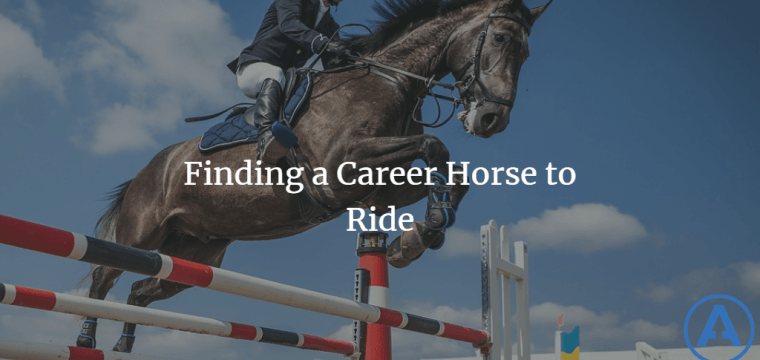Finding a Career Horse to Ride
Date Published: 22 May 2019

About 20 years ago I read the book, Horse Sense, by Al Ries and Jack Trout. The authors posit, “The key to success if finding a horse to ride.” In the authors typically direct and simple style, filled with real world stories and anecdotal evidence, they categorize the many different “horses” one might find to ride toward success.
I’ve gifted this book to many people over the years because the advice it contains, while somewhat dated now in 2019 (the authors take quite a few jabs at Donald Trump and his lackluster record of success in the 80s, for example), the main lessons hold up. Even more today, with our extremely connected information and social media culture, it’s nearly impossible to be successful without the help of others.
What others? There are a wide variety of strategies you can apply. There are obvious ones, like going into the family business or sticking with a boss or coworker as they rise through the ranks. If you’re starting a business, the others might be investors or customers or partners or all of the above. The key is that “success is something others give you, not something you get for yourself.” You need to convince others of your value, and they will make you successful.
What if you just work harder, won’t people just notice? If you’re lucky, but don’t count on it. Just working harder only gets you so far. And there are diminishing returns. As the authors note in one story, “I can do almost as much work in 11 hours as I can do in 10.” Work smarter, not harder. The go on to say “Hard work and a good horse will get you anywhere. The hard work is optional.”
So how do you get noticed by the right person, such as a key boss or higher up? Flattery is an obvious tactic, but the authors cite psychology professor Ronald Deluga’s advice. He recommends identifying someone “who interacts often with the target and tell that person good things about your boss. (It could be a coworker, your boss’s superior). He or she will pass it on.”
The most important takeaway from the book is to be aware of the importance of others in your own success, and be open to opportunities to find a horse when you notice them. The book’s been out of print for years but you can usually find a used copy for under $10.
What if you don’t know anyone you think would make a good horse? Well, you’re fortunate to be living in the 21st century. You can interact with virtually anyone online. Follow the people on social media that you want to emulate or interact with. Follow the advice above and in the book *as if you were interacting with these people in real life*. Don’t harass them. Don’t be creepy. But do like their posts when appropriate. Better than a like is a retweet/share, especially with some additional comment. Do that for a while, and they may start interacting with you. And from there you can eventually develop trust which can open doors to future opportunities.
Don’t discount obvious networking opportunities, either, like user groups or meetups. And industry events provide an opportunity to meet with industry leaders like speakers and organizers. Don’t pass up these opportunities. Talk to the speaker after their talk. Ask a question or just tell them what you thought. Same for the event organizers. Look to follow up afterward via email, twitter, slack, or whatever is appropriate. From there you may have the opportunity to develop the relationship further. The best way to do that successfully is by offering something of value. How can you help the event? Maybe offer to volunteer. Maybe offer to try and get your company to sponsor. Maybe offer to help find speakers. How can you help the speaker? Maybe offer to try and get them to come speak to your team (remotely or on site). Maybe offer to share some real world experiences with them that they may find useful in a future version of their talk. Be creative, but make it about how you can help, not just what you want.
If you found this helpful, consider sharing it. Here’s a tweet you can just retweet.
Finding a Career Horse to Ride https://t.co/1pr3nBo5sz#career #programming #business #books #mentoring #networkingbusiness
— Steve "ardalis" Smith (@ardalis) May 22, 2019
If you’re looking to network with me and a group of motivated developers looking to advance in their career, check out my group mentoring program at devbetter.com. Thanks!
Category - Browse all categories

About Ardalis
Software Architect
Steve is an experienced software architect and trainer, focusing on code quality and Domain-Driven Design with .NET.
